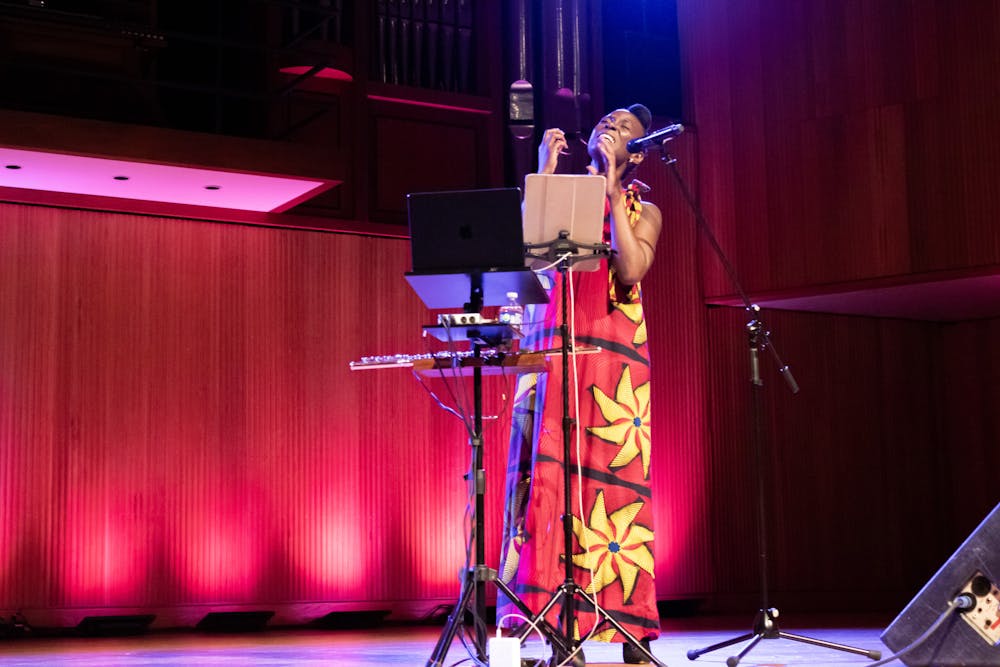Nathalie Joachim wanted to play a game with her audience.
“We’re going to play a game that I always win,” Joachim said. “I’m going to say ‘I love you,’ and all of you are going to say, ‘I love you more.’”
This atypical game started awkwardly. The first “I love you” led to smatterings of meek responses.
“I can’t hear you!” Joachim called out.
Laughter ensued before a response from the audience: “We love you more!”
The call and response grew louder as more people joined in, their voices becoming more vibrant.
Joachim — a Grammy-nominated Haitian-American composer, flutist and vocalist — debuted her sophomore album, “Ki moun ou ye,” live in Lippes Concert Hall on Saturday.
She started her show with a story.
“My grandmother was my first music teacher,” Joachim said. “Most of the skills that I’ve been working to get back to in terms of creative expression in my own artistic practice were things she taught me. Her foundation is what I come back to every time.”
Her grandmother is even featured in the electronic vocals of “Kenbe m” — a Haitian hymn in which she thanks God for holding her hand. As the two voices combined, a hush fell over the room as the audience witnessed a personal, intimate exchange between Joachim and her grandmother. The powerful musical connection became so palpable that audience members hesitated to interrupt it with applause, even after the song had ended.
Joachim examines and emphasizes ancestry with her melodies, which are rooted in her familial experiences so deeply that it’s impossible to separate the artist from the people she came from. That’s also why most of Joachim’s lyrics are in Haitian Kreyòl.
“Haitian music is richly complex rhythmically, and our music is so intertwined with our language that it’s hard to separate the two,” Joachim said. “A lot of the rhythmic context and language itself is informed by the story that’s being told, informed by the type of setting for music itself.”
Joachim explained that her new record is her “first foray” into songwriting in Haitian Kreyòl. That’s made the writing process more complex, as the language is full of “double meaning,” including the very first song she performed, “Ki moun ou ye.”
“The question is literally, ‘Who are you?’ but the true translation is, ‘Which person are you?’A voice is an instrument that is singular to all but contains a multitude of all the people who have come before you,” Joachim said. “Which of the people who came before you do you identify with? Who do you belong to? It’s a question intended to interrogate you about your ownership of self.”
Even though most audience members won’t understand Haitian Kreyòl, the melodies still provoke the feeling behind the lyrics. It’s an instinctive pull to empathize with the desire for self-acceptance and belonging. Regardless of what the title exactly means, the emotions it inspires are universal.
Joachim’s question, “Ki moun ou ye,” may have a satisfying answer, but getting to it requires confrontation. She introduces one of her pieces, “Ti Nèg,” with a story about her father, who immigrated to America from Haiti.
“It was the first time he realized he was Black, and that meant something else somewhere,” Joachim said. “My family is from a place where this is not confronted on a day-to-day basis.”
This song is dedicated to reclaiming the meaning of nèg, which carries two meanings. In Haiti, the word describes a young boy; in America, the word has a history of being used to inflict racial abuse, a meaning that persists today.
“Even though you tried to abuse us with this word, we’ve owned [it], made it us, claimed our power,” Joachim sings.
This thread of empowerment is interwoven deeply throughout the album, tying everything together. Its journey began — and ended — in the past.
“Where can these stars take us? I think of all the people who came before me and what they might have dreamt of,” Joachim said. “There’s a saying that we are our ancestor’s dream, and I hope that’s true.”
The arts desk can be reached at arts@ubspectrum.com

Mylien Lai is the senior news editor at The Spectrum. Outside of getting lost in Buffalo, she enjoys practicing the piano and being a bean plant mom. She can be found at @my_my_my_myliennnn on Instagram.





